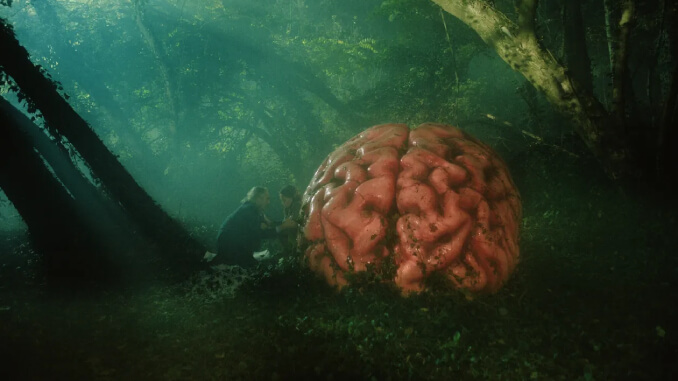A specter is haunting the rules-based liberal world order: The specter of shambling, moaning, masturbating bog zombies, rising from the German countryside to terrorize the leaders of the world’s foremost democracies. There’s a giant brain in the forest, the Italian prime minister keeps pulling deli meat out of his pockets, and the president of France thinks his leg bones are melting. World leaders are screwing in the woods, and the EU representative has lost her mind and started speaking Swedish. Are the zombies protestors from the great beyond, or an apocalyptic omen? How does the giant brain fit into all this? Or the pedophile-hunting AI chatbot? Have we come to the real End of History, less Francis Fukuyama and more Book of Revelation?
Rumours, a surreal satire co-directed by the idiosyncratic Canadian cult filmmaker Guy Maddin and his frequent collaborators Evan and Galen Johnson, leaves most of these questions unanswered. As it begins, the leaders of the G7 countries (that is, the U.S., the U.K., Germany, France, Japan, Italy, and, of course, Canada) have gathered to produce “a draft outline of a provisional statement addressing the present crisis.” (The nature of said crisis is left vague, though there are mentions of climate change, supply chains, and “cyber sex crimes,” among other things.) The summit is being hosted by the German chancellor (Cate Blanchett, having a blast with the accent) at a secluded mansion, near a dig where archeologists have found an Iron Age bog body with a severed penis. Might it be, as one character suggests, a king or chief sacrificed in a more primitive era of political ceremony?
Even in these early scenes, a strangeness pervades the film: ironic, sometimes stagey or soapy, occasionally punctuated by over-the-top musical cues. Maddin, whose distinctive filmography includes the likes of Brand Upon The Brain!, The Saddest Music In The World, and The Forbidden Room, has spent his career remixing the stylized techniques and degraded textures of silent films and early talkies to dreamlike and often delirious effect. Rumours (which is set in something like the recognizable present and looks more or less like a movie made in the 2020s) is therefore an aesthetic outlier—though, like much of Maddin’s work, it is governed by the maddening logic of melodramas and dreams.
As the group gather in a gazebo to dine and work, night falls and things get weirder. The French president (Denis Ménochet) stumbles in covered in mud with a vague story about getting lost and wrestling with a corpse. The caterers and bodyguards have vanished, the mansion appears abandoned, the phone service is dead, and a fog is setting in. There are, eventually, the reanimated dead to contend with, as well as the personality clashes of the leaders. The American president (Charles Dance, not even attempting an American accent) is a grandiloquent codger who fantasizes about being assassinated. The Canadian prime minister (Roy Dupuis, in the film’s funniest performance) is a moody ex-activist himbo who attempts to distract the zombies with a land acknowledgement and at one point angrily bellows, “I love strong women! I love them too much!” In a feverish moment, a thought crosses their French counterpart’s mind: Is this all an allegory?
Obviously, the answer is yes. But part of the fun of Rumours is the aforementioned dream logic: Its absurdist imagery may be interpreted in multiple ways (e.g. all the stuff about penises, which can be read as an indictment of the political class’ voluntary impotence and its proclivity for self-gratification), or it may be meaningless and whimsical. When it comes to the stuff of the subconscious, these possibilities are not mutually exclusive. However, this doesn’t mean that it’s all open to interpretation. Even in the occasional stretches when the film drags or repeats itself, the central point of its satire of liberal-democratic world politics remains clear. Whatever the crisis may be (and here one is invited to insert the pressing issue or issues of their choice), these heads of state would be doing the same thing: Playing Mad Libs with inane geopolitical buzzwords to draft another meaningless, onanistically self-congratulatory joint statement.
Director: Guy Maddin, Evan Johnson, Galen Johnson
Writer: Guy Maddin, Evan Johnson, Galen Johnson
Starring: Cate Blanchett, Alicia Vikander, Charles Dance, Denis Ménochet, Roy Dupuis
Release Date: October 18, 2024


 Keep scrolling for more great stories.
Keep scrolling for more great stories.